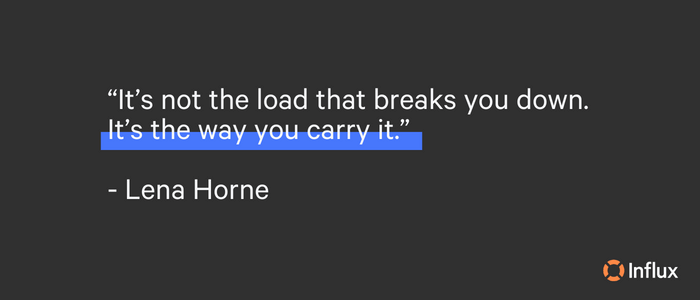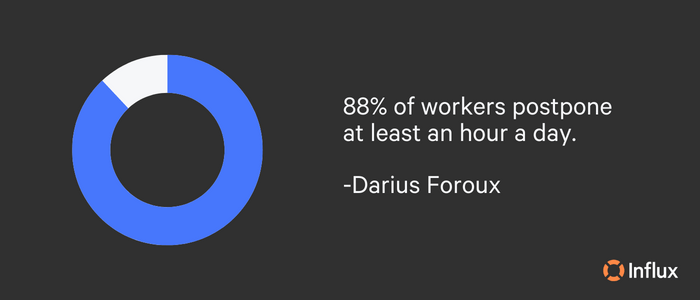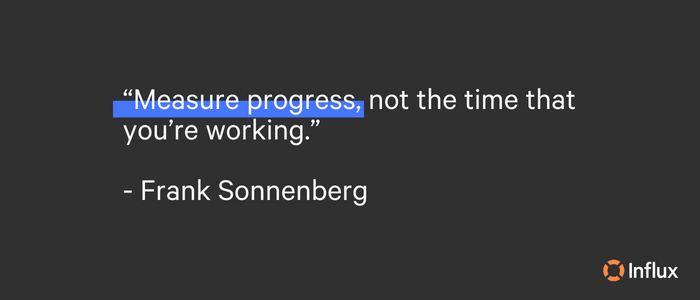Influx has built support teams for more than 300 high-growth brands in the US, Australia, and Europe. We hire, train, and empower a remote community with the top 1% of customer support agents, spread over 120+ cities. Learn more about how it works{: target="_blank" rel="noopener"} →
An efficient workplace performs at a pinnacle to minimize wasted time, effort, and resources. It also allows teams to accomplish increased results in a shorter period. How fantastic would it be to do something that used to take you half a day to accomplish in a fraction of the time? With concentration and minimal distractions, it’s possible.
This blog is focused on working smarter, not harder with 5 simple tips to improve departmental efficiency. Whether you’re a leader looking to boost team productivity or an individual who is tired of wasting time, these tips can help!
 {: width="700" height="300"}
{: width="700" height="300"}
Working smarter, not harder
We’ve all heard the phrase ‘work smarter, not harder.’ Now, we’re putting it into application. Working smarter values your energy and optimizes your time. Additional benefits of efficient work include:
- Improved work-life balance
- More motivation
- Increased free time
- Preventing, reducing, or recovering from burnout
- Meeting deadlines
The list goes on. Working smarter implies caring about the work process as much as the task. This means prioritizing, delegating, and sharpening your time management. Let’s dive in!
5 tips to improve departmental efficiency
1. Front-load your week
Tackling top-priority items at the beginning of the week can help reduce stress throughout the week. It also permits time for any additional tasks that may come up. Set yourself and your team up for success by planning to put the larger, more arduous tasks at the beginning of the week, or even first thing each morning. Motivated and well-rested from the weekend, Monday offers rejuvenated energy so you can give your best effort. According to Forbes…
Our most productive day of the week is Monday (20.4% of tasks). We’re least productive at the end of the week (Friday, 16.7%).
Energy levels and motivation taper off with each passing day leading up to the weekend. Encourage your team to front-load their work for increased departmental efficiency.
 {: width="700" height="300"}
{: width="700" height="300"}
2. Create a culture of feedback
A leader’s willingness to improve oneself heavily influences leadership effectiveness. Creating a culture of feedback is important. Leaders and peers should be open to receiving and providing feedback that encourages growth and improvement. Enthusiasm for seeking opinions creates a more collaborative and unified team. Feedback can also keep work moving smoothly by cutting back on self-doubt or bouncing ideas around. A positive feedback culture enables improved efficiency from leaders and teams toward shared goals of high-quality work.
3. Don’t let meetings ruin productivity. Communicate concisely!
Unnecessary meetings, or unnecessarily lengthy meetings, can kill focus. According to Zippia…
Organizations spend roughly 15% of their time on meetings, with surveys showing that 71% of those meetings are considered unproductive. An estimated $37 billion is lost per year to unproductive meetings.
Considering the amount of time spent on meetings, they can significantly cut into efficiency. The problem is that meetings are scheduled with good intentions, but that doesn’t always mean they are beneficial. Most meetings are typically 30 minutes to an hour. The 20/50 rule suggests shortening meetings to 20 minutes or 50 minutes. This allocates time to reflect, recover, and prepare to jump into the next task.
Reduce wasted time by creating agendas for meetings, enforcing hard stops, strengthening communication skills to shorten discussions, or weeding out needless meetings. Meetings often get a bad rap, but strictly keeping to schedule and practicing concise communication can help to minimize wasted time.
 {: width="1440" height="400"}{: target="_blank" rel="noopener"}
{: width="1440" height="400"}{: target="_blank" rel="noopener"}
4. Time block, make room for short breaks, and encourage deep work
How long should a task take? Keeping track of time brings inefficiencies to light. Of course, occasional roadblocks come up, but these can reveal any bottlenecks that are putting a hold on workflow and can encourage thinking ahead to any assets or approvals needed by planning accordingly. Alternatively, a task may get completed quicker than expected, creating a new standard or allowing space for a short break to recharge. In fact, taking a higher amount of short breaks can increase productivity and focus, though they may not be a standard in many workplaces. In survey data shared by Gitnux…
38% of respondents reported having meal breaks that are less than 30 minutes. 35% said they eat their meals at their desks or workstations every day. 22% said they take zero work breaks, excluding restroom and meal breaks. The same report states that employees likely have lower wellness if they have short meal breaks, eat meals at their workstations every day, or don’t take breaks at work.
Although there are proven benefits to short breaks, 38% of employees don’t feel encouraged to take a lunch break. In a separate survey by Tork, nearly 20% of North American workers worry their bosses won’t think they are hardworking if they take regular lunch breaks, while 13% worry their co-workers will judge them.
Encouraging breaks in the workplace may seem counterintuitive for productivity, but overall, they can create a highly focused and more sustainable work environment. As a personal example, I sometimes find it difficult to motivate myself to complete highly repetitive tasks that cannot be automated. I speak for everyone when I say that these repetitive tasks can get quite boring. I catch myself putting them off until the very last minute and then, stressed; I rush to finish the task.
Recently, I started implementing a time-blocking system for myself. Every morning I take 5 minutes to prepare my task list for the day and write down an estimate of how long it will take. Bunching small tasks together, I make an effort to work without distraction for 2-3 hours at a time. After those hours are up, I check in and reward myself with a 5-10 minute break if I feel that it's needed. This mindfulness approach to work is also known as ‘deep work,’ a term coined by Cal Newport, a computer science professor at Georgetown University and author of “Deep Work: Rules for Focused Success in a Distracted World.” In his book, Newport defines deep work as a state of distraction-free concentration when your brain works at its maximum potential.
Combining time blocking, short breaks, and deep work is something that every department can benefit from. Give them a try for a more efficient workplace.
 {: width="700" height="300"}
{: width="700" height="300"}
5. Commit to deadlines and that task you keep procrastinating
Hard deadlines aside, it’s the soft deadlines or the procrastinated responsibilities that cut into efficiency. I don’t mean getting your priorities straight, but rather the tasks that you put off until later because, well, you can just do them later. People procrastinate for all sorts of reasons, but the hard truth is that the task you keep putting off probably won’t be as bad as you think. Mentally, these projects also take up a lot of space and can be a distraction from focusing on deep work.
Utilizing the above tips may mean tackling a task after a small break, or structuring your day from high-priority items to low-priority items, but adding tasks that are usually procrastinated in between. If you find it to be a motivator, you may also try doing your procrastinated projects earlier in the week/day, or before your pressing responsibilities. That way you get what you’ve been putting off finished and can devote your time and energy to what needs to get done. Committing to procrastinated tasks ensures that these responsibilities get completed promptly and don’t get put off so long that they eventually become a high priority.
 {: width="700" height="300"}
{: width="700" height="300"}
The bottom line
In an ideal workplace, everyone is punctual and executes their work in a timely manner. Realistically, there are obstacles and life sometimes gets in the way. Implementing these tips for efficiency allows your team to work smarter, not harder, and offers a bit of leniency for off days or low-motivation moments.
 {: width="1440" height="400"}{: target="_blank" rel="noopener"}
{: width="1440" height="400"}{: target="_blank" rel="noopener"}
Support teams on demand
Influx provides an extra layer of support for your existing team. We help businesses scale by providing top-tier sales, lead development, expert customer support, and more. We can get you up and running in a week with simple, month-to-month pricing. Scale your business with support on demand!{: target="_blank" rel="noopener"}


 6 Circle - small.png)